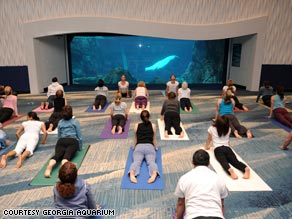 Image by meliam via Flickr
Image by meliam via Flickr
Thomas Merton expressed the challenge, and heroic nature of our struggle to embrace with lovingkindness that which we like least in ourselves, and others, when he said, “True prayer and love are learned in the hour when prayer becomes impossible and the heart has turned to stone.”
The idea behind the Buddhist approach to lovingkindness practice is that it is, a practice. Something we must do repeatedly and with discipline until it becomes an integral part of our deepest selves; an automatic reaction to people and events in our world. The process of turning a heart of stone into a heart that is softened with the deepest compassion and love is a step-by-step process that we have the opportunity to practice in every moment of our lives.
One of the most effective ways to begin a lovingkindness practice is through the use of Metta meditation. In this simple meditation we offer a wish for freedom, happiness, and the cessation of suffering for a particular person, group, or the entire world. A basic Metta meditation for all beings is:
May all beings be happy.
May all beings be free from suffering.
May all beings be at peace.
An example of Metta directed towards a particular person is:
May _________ be happy.
May _________ be free from harm.
May _________ be filled with peace.
You can repeat one, or all three of the phrases over and over, aloud or in your head, for 2-5 minutes while visualizing the person or group you are focusing on, and imagining that you are sending this lovingkindness out to them. Because it can be challenging to focus on and offer this sort of energy to those who we have negative feelings towards, it is recommended that the practitioner proceed by first offering Metta to themselves, then to a benefactor, a friend, a neutral person (bank teller, someone you see on a walk), a difficult person, and finally, All Beings. It is important to start the focus of our practice by offering lovingkindness to ourselves, because only by having a truly deep and abiding love for ourselves can we have this same love for others.
As part of the self-love aspect of a lovingkindness practice we can reflect back to the yogic practice of Ahimsa (non-violence, non-harming.) We must remember as we strive to fill our hearts, minds and actions with lovingkindness that we are only human, and we will often fall short of our ideals. In those moments we must embrace Ahimsa and not react violently towards ourselves, but rather use the next moment as an opportunity to start once again in the mindset of lovingkindness by offering it with gentleness and compassion to our selves.
Because Metta meditation is formed from such simple phrases it is a wonderfully portable tool that we can bring into our daily application of lovingkindness. When we find ourselves in a long line at the supermarket, or being cut off in traffic, or treated unfairly in our workplace, instead of becoming angry, and slipping to what author Joseph Goldstein calls, “the seductive habit of finding fault,” we can pause for a moment and offer a pledge of lovingkindness to the person that is causing us distress. By slowing down and being less reactive, we can often see the good qualities of the person we are confronted with, or “put ourselves in their shoes” for a moment. From this calm, centered point-of-view we can better see the reality of the situation and act in a logical manner that will bring the most wholesome outcome for all those involved, rather then reacting from a place of fear, irritation and anger. In time, lovingkindness removes the illusion of separation from each other that we often feel.
As the Dalai Lama says, “Through the practice of lovingkindness and compassion I have found that all human beings are just like me.”
May you be happy. May you be free from all suffering. May you be filled with peace.
Lovingkindness Practice Resources
Lovingkindness: The Revolutionary Art of Happiness by Sharon Salzberg
Radical Acceptance: Embracing Your Life With the Heart of a Buddha by Tara Brach
The Gift of Loving-Kindness: 100 Meditations on Compassion, Generosity, & Forgiveness by Mary Brantley and Tesilya Hanauer
DailyBuddhism.com (Website) from Brian Schell
© 2009 Teal Marie Chimblo and Blissful Body Yoga






















